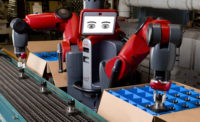Rethink Robotics Gets Rethought

Rethink Robotics, the pioneering manufacturer of the Baxter and Sawyer collaborative robots, closed for business Oct. 3, just 10 years after it started.
Rethink was co-founded by Rodney Brooks and Ann Whittaker in 2008. Before starting the company, Brooks was a professor of robotics at the Massachusetts Institute of Technology and former director of the MIT Computer Science and Artificial Intelligence Laboratory. He was also the founder and former chief technical officer of iRobot, the maker of the Roomba home vacuum-cleaning robot.
Rethink was launched with the aim of creating low-cost, easy-to-use robots. In 2012, the company released Baxter, a vision-guided, dual-arm cobot that can safely work side-by-side with people on assembly lines. Three years later, the company released a smaller, more flexible model, Sawyer, a one-armed cobot for smaller, more detailed tasks.
Although Rethink was among the first companies to commercialize cobots for manufacturing, it was quickly overwhelmed by competition from mainstream robotics companies, including ABB, Fanuc, KUKA, Comau, Stäubli and Universal Robots. It’s tough to be a startup when your top competitors combined for more than $45 billion in revenue last year.
While Rethink’s demise is unfortunate, it’s hardly a referendum on cobots as an assembly technology. According to the International Federation of Robotics, demand for cobots is growing 60 percent annually. By 2025, cobots are expected to make up 34 percent of all robot sales, up from less than 5 percent today.
ASSEMBLY’s 2018 State of the Profession study confirms this trend. Some 38 percent of assemblers plan to plan to deploy cobots during the next 12 months. That’s 7 percentage points more than in 2017 and 12 percentage points higher than in 2016.
Because they are flexible and require little or no safety barriers, cobots are being used by a variety of manufacturers. The machines particularly appeal to smaller companies. Indeed, many of Rethink’s customers were small or midsized manufacturers.
For example, Cox Container, a manufacturer of blow-molded plastic parts, has deployed Sawyer at its factory in Troy, AL. Like many manufacturers in the plastics industry, Cox has struggled to hire and retain a quality, engaged workforce. Cox turned to automation to fill the labor gap and boost productivity.
In particular, Cox was having difficulty with a workcell where two employees were required to pack newly molded bottles. The pace was too vigorous for one worker to keep up, but not enough to justify a second. Sawyer assists one worker with packaging, allowing other employees to add value and participate elsewhere within the factory. Counting all shifts, Sawyer freed up three full-time workers, enabling them to do more meaningful work.
This is what automation is all about. Saving jobs and helping manufacturers compete. Cobots are not for every application, but we can’t wait to see how assemblers will use them next.
Looking for a reprint of this article?
From high-res PDFs to custom plaques, order your copy today!









